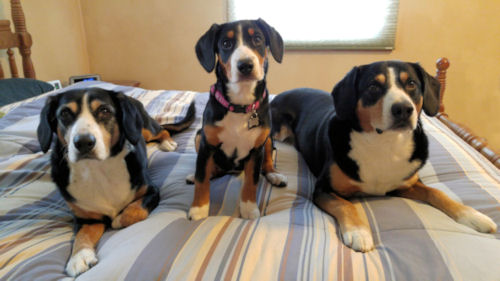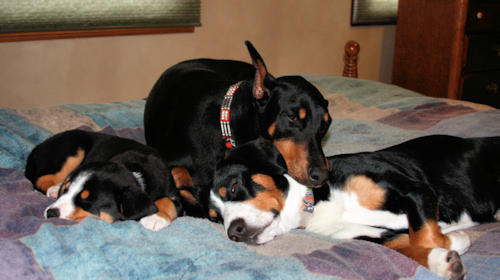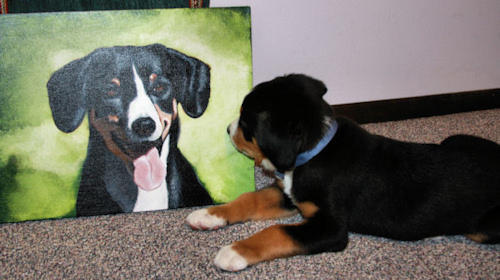
Therapy Work
Paws for love and make smiles happen!
Therapy Dogs
Surprise! I never imagined how enjoyable doing canine therapy work would be or that I would get more out of it than my dog or
the people we visit. You really can make a positive impact on a person's day and even their life with the smallest of gestures. Welcome to the world of therapy dogs.
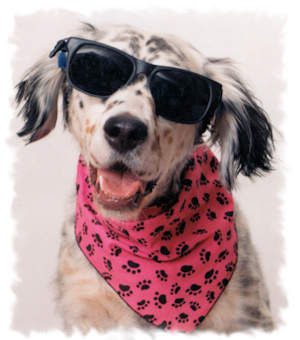 Our English Setter, Mutley initially introduced me to therapy work. Mutley was gentle, affectionate, sweet and really not the best performance sport dog. In hindsight, she was our first dog that we trained and showed, so we made many mistakes. She was patient, forgiving and had much potential. Mutley was also very independent and had her own priorities that didn't always include structured training or competing. Mutley's natural talent... she was a cuddler and made you feel like you were the most important, special person in the room! People who claimed to 'not like dogs', were drawn to Mutley.
Our English Setter, Mutley initially introduced me to therapy work. Mutley was gentle, affectionate, sweet and really not the best performance sport dog. In hindsight, she was our first dog that we trained and showed, so we made many mistakes. She was patient, forgiving and had much potential. Mutley was also very independent and had her own priorities that didn't always include structured training or competing. Mutley's natural talent... she was a cuddler and made you feel like you were the most important, special person in the room! People who claimed to 'not like dogs', were drawn to Mutley.
We started searching for another enjoyable activity for Mutley; one where she would shine. Once again, my sister-in-law Vicky knew the answer. She had been doing therapy work at her Temple and in the community with her German Shepherds. Vicky encouraged us to look into therapy programs in our area. TDI- Therapy Dogs International® was the best fit for us. We found an active local group; Chapter #184: TDI of Central Wisconsin. We scheduled our TDI testing; passed and became a certified therapy team. We mostly visited nursing homes and did public education events. There is also an organization called Pet Partners that is worth looking into.
Adventures in Therapy Work with an Entlebucher
Certified TDI dogs can participate in a variety of programs to provide companionship and offer emotional support. Many teams spread cheer visiting nursing homes or hospitals and new opportunities are popping up as the health benefits of therapy dog interactions are being studied and better understood. Therapy dogs are being used during academic testing, at counseling centers, after crisis situations, in airports, and in other places their unique talents can help. AKC includes title recognition for the important work therapy dogs perform. It's called: AKC Therapy Dog Program Touching hearts. Changing Lives. Title = THD.
Bayla was always outgoing and loved adventure. She enjoyed going new places and meeting new people (especially kids), so therapy work seemed to fit her personality. I wasn't sure she could settle down or even sit still for any length of time and "gentle" wasn't really a term used to describe her... playful, exuberant, intense were all more appropriate. NEMDA's Guthrie Award for working Entles helped provide the motivation I needed to see if we could succeed as a therapy team. We tested; Bayla passed her TDI certification.
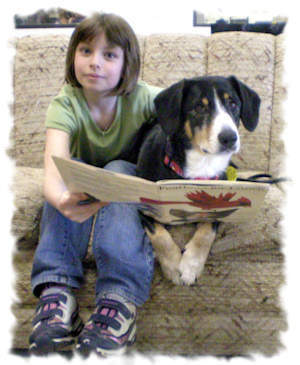 Bayla loved to work! When we did therapy work she wore a special collar, TDI bandana and had a different leash. Once she was into the routine and understood therapy work as her job, we could see a transformation take place in her. We found many opportunities suited for her. She was very intuitive and seemed to know what each individual or situation needed from her. Bayla enjoyed events and worked as a hugger at Special Olympics. She loved performing tricks to amuse and amaze all new friends.
Bayla loved to work! When we did therapy work she wore a special collar, TDI bandana and had a different leash. Once she was into the routine and understood therapy work as her job, we could see a transformation take place in her. We found many opportunities suited for her. She was very intuitive and seemed to know what each individual or situation needed from her. Bayla enjoyed events and worked as a hugger at Special Olympics. She loved performing tricks to amuse and amaze all new friends.
My favorite therapy activity was the kids reading program! Bayla and I visited a local elementary school and the Boys & Girls Club of Plover, as part of their weekly reading program. TDI's official name for it is Tail Waggin' Tutors. Programs like these encourage kids to enjoy reading and help them relax while developing their reading skills. Each child gets individual reading time with the dog; no other kids, parents or adults are present. The dog’s handler stays to supervise the interaction but does not interfere. The true beauty of the program is that dogs are non-judgmental. They don't correct word pronunciation or care about the speed a child reads at so the pressure of feeling self conscious reading out loud is removed. In one special case I remember getting teary eyed watching Bayla work her magic with one of her reading kids.
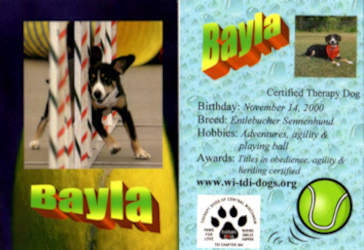 Bayla seemed to hang on their every word and give them her undivided attention. That quality is priceless, for anyone. The kids would pet her to ease their anxiety when they struggled over words; they’d talk to her and tell her stories; even lean over and whisper secrets in her ear. It was most heartwarming when they showed her the pictures in their book! And they would tell me how much they looked forward to "Bayla reading day."
Bayla seemed to hang on their every word and give them her undivided attention. That quality is priceless, for anyone. The kids would pet her to ease their anxiety when they struggled over words; they’d talk to her and tell her stories; even lean over and whisper secrets in her ear. It was most heartwarming when they showed her the pictures in their book! And they would tell me how much they looked forward to "Bayla reading day."
Our TDI chapter encouraged us to have our dogs put on "trading" cards to give out as tangible momentos. The cards were very popular. Here's Bayla's >
It's pretty neat to see them posted at local businesses or when a kid pulls out their "Bayla card" to acknowledge "Bayla-the-reading-dog's mom!" Having local celebrity status for being a therapy dog's mom- that's pretty cool!
Bayla's grandma Shaman enjoyed a wonderful Delta Society therapy dog career too. If we had found the time, I am certain Data could have followed in their pawsteps. Therapy work takes a significant time commitment. Kai did not have the general interest in people for therapy work, neither does Risa. Jaylah could have a promising therapy career and possibly Geordi. It is more out of the ordinary for Entlebuchers to enjoy therapy work. The breed standard acknowledges the qualities of being aloof or reserved with strangers. In my research and eagerness to continue learning about the breed, I discovered that part of the reason for this is their ingrained heritage of being general all purpose farm dogs. In Switzerland the farms are very far apart so the entlebucher also served as a watchdog, ready to alert their family of anyone's presence on the homestead.


The Heading1
This is an example of the content for a specific image in the Nivo slider. Lorem ipsum not available so I'll just type a bunch of stuff....
The Heading2
This is an example of the content for a specific image in the Nivo slider. Lorem ipsum not available so I'll just type a bunch of stuff....
The Heading3
This is an example of the content for a specific image in the Nivo slider. Lorem ipsum not available so I'll just type a bunch of stuff....


Dogs are not our whole life, but they make our lives whole - Roger Caras
